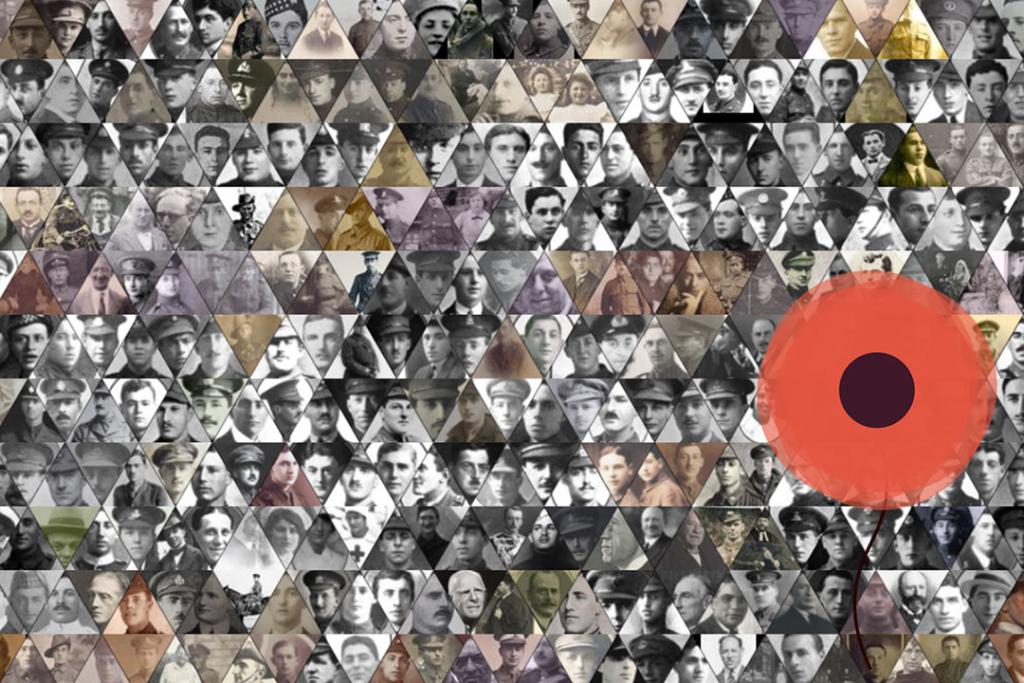Liverpool’s Jewish community in the First World War
During the First World War 50,000 Jewish men served in the British armed forces and thousands of Jewish women went into war work. Of those 50,000, at least 2,425 Jewish men died on active service, and a further 6,500 returned home wounded. The British Jews in the First World War - We Were There Too project aims to capture, record and preserve the stories of these men and women as a digital archive, so they are not forgotten for future generations. Project Researcher Charlotte Clare has taken a closer look at the Merseyside community’s involvement.

In 1914 there was a large, thriving Jewish community in Liverpool; with two synagogues, a Hebrew school, kosher butchers, and many charitable and social organisations. For example, Galkoff’s Kosher butchers, located at 29 Pembroke Place, was established by Percy Galkoff after moving to Liverpool from Poland (via Birmingham) around 1907. You can see the life-sized recreation of the tiled frontage of the shop in the Galkoff's and the secret life of Pembroke Place display in The People’s Republic gallery, Museum of Liverpool.
The Liverpool Hebrew Schools were established in 1840 and moved into their permanent residence on the corner of Pilgrim Street and Hope Place in 1854. The building is still used as an educational setting today, as it is owned by Liverpool John Moores University and used by their Drama department.

The former Liverpool Hebrew School building in Hope Place
At the outbreak of war, a large number of the Liverpool Jewish community enlisted into the armed forces. In the Autumn of 1914, the headmaster of the Liverpool Hebrew Schools, Mr Levy, requested that the Old Boys serving in the forces send photographs of themselves and details of their service. The responses to this request are available to view as a Collection on the We Were There Too project website, thanks to the Liverpool City Archives.
One of these Old Boys was Joseph Bernstein, who enlisted at the age of just 16 under the name J Benson. His father Eli responded to Mr Levy’s request, and informed him that, in December 1914, Joseph was stationed in Blackpool with his regiment the 6th Liverpool Rifles.

Photo of Joseph Bernstein with a letter from his father Eli to Mr Levy. Courtesy of Liverpool City Archives
Another who answered Mr Levy’s request was Sydney Goodman who served in the Royal Army Medical Corps in a Field Ambulance Unit. Sydney was born in Liverpool in 1890, and left the Liverpool Hebrew School in 1904. As well as earning the 1915 Star, British War and Victory medals for his service, Lance Corporal Goodman was also awarded the Legion d’Honneur and the Croix de Guerre by the French authorities for distinguished services.

Photo of Sydney Goodman with a letter from him to Mr Levy. Courtesy of Liverpool City Archives
Lina Beer, another member of the Liverpool Jewish community, was also awarded for her activities during the war. Born Lina Stern in Germany in 1872, the family moved to Liverpool when she was a teenager, and in 1894 she married Walter Beer and settled in Toxteth Park. Lina was the Founder and Commandant of the Bradstones Auxiliary Hospital in Sandfield Park, West Derby, Liverpool. According the British Jewry Book of Honour, over 600 patients passed through the institution from March 1917 to March 1919. Mrs Beer was awarded an OBE for her work establishing and running the hospital in 1920.

Lina Beer, courtesy of Imperial War Museum
Lina and Walter Beer’s son Arthur was studying at Trinity College, Cambridge at the outbreak of war, and immediately enlisted with the Royal Field Artillery; with whom he served on the Western Front from 1915. Arthur was awarded the Military Cross “for conspicuous gallantry and devotion to duty. When all communications were cut and runners could not get through to the batteries, this officer volunteered to go forward, and at great personal risk went round all the batteries, collecting information and arranging for reinforcements. Later, while reconnoitring new positions, he was severely wounded.” Sadly he died of his wounds on 21 April 1918, and is buried in Lapugnoy Military Cemetery in France.
Benn Jack Brunel Cohen, who became Conservative MP for Liverpool Fairfield in 1918, dedicated his life to the welfare of disabled people and ex-servicemen. He was born in Liverpool in October 1886 to Martha (May) and Louis Cohen, who was Director of the Lewis’ department stores. Cohen joined the King’s Liverpool Regiment in 1906, serving with a territorial battalion, with whom he continued to serve after the outbreak of the First World War. On his own request however he was sent to the Western Front in early 1917, where he was injured at the Third Battle of Ypres, leading to both of his legs being amputated above the knee.
Two of his brothers also served in the King’s Liverpool Regiment on the Western Front: Samuel Gilbert who survived and George Hubert who was killed in action. Both of these men were in the same regiment, and according to George’s obituary in the Cheltenham Chronicle, Samuel saw George fall and went to him, being wounded himself in the process.
Brunel Cohen used his work as an MP to campaign for the advancement of disabled people, particularly those disabled by war, including for issues around employment, training and war pensions, and was instrumental in the founding of the British Legion.
Discover many more stories of the Liverpool Jewish community and beyond during the First World War on the We Were There Too project website . As part of Remembrance Week at the Museum of Liverpool, the We Were There Too project is also being featured on the atrium screen and in a pop-up display on the first floor of the museum, from 10 to 21 November 2021.
